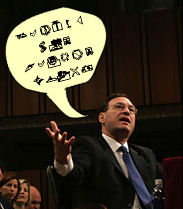He Believes in Believable Beliefs
 Thursday, January 12, 2006 at 11:04AM
Thursday, January 12, 2006 at 11:04AM  Quote: "I think the Constitution is a living thing in the sense that…it sets up a framework of government and a protection of fundamental rights that we have lived under very successfully for 200 years." Supreme Court Nominee Samuel Alito.
Quote: "I think the Constitution is a living thing in the sense that…it sets up a framework of government and a protection of fundamental rights that we have lived under very successfully for 200 years." Supreme Court Nominee Samuel Alito.
Figure of Speech: antistasis (an TIS ta sis), the repeat that changes meaning.
A Senator asked Alito what he thought of the "living Constitution"— the concept that the Supreme Court's interpretations must adapt to societal change. Liberals love it, conservatives hate it.
His answer: "The Constitution is living because we live under it." (Thanks to Slate’s Dahlia Lithwick for the translation). An antistasis (Greek for "anti-position") repeats a word while changing its meaning. Alito uses it to express precisely what he means to say:
Nothing.
Snappy Answer: "It was living, but I think you just talked it to death."



Reader Comments (2)
Is it changing the meaning of a word to mislead, or to render it meaningless, or perhaps adding another dimension or use of the word? Or does it matter.
Is his qualification of the word 'living" and further explication an example of antistasis, or one he didn't get away with. I'm not sure it meant "nothing." Nothing is not a different meaning, its jibberish. But it is a good example of a lawyer using his rhetorical skill in a tricky situation, but it does have meaningful content.
I am a lawyer and a liberal. When I read the excerpt I knew they were discussing a controversial and still confusing political and judicial issue, as well as a physical document. I see that he used "living" to modify the word Constitution and then used it to refer to the quality of our lives under the Constitution for the past 200 years. But he did qualify the usage himself.
Yes, he said "a living thing" which is ambiguous and could imply the Constitution is open to interpretation. But I don't believe he meant that; he continued "in the sense that", showing what that wording actually means to him. This indicates his wording was metaphorical. He then explained it this way, "a framework....we have lived under successfully for 200 years."
He used the past tense. I sensed right there his approval of the 3 branches of government, the protections provided by the existing amendments all clearly set out in the existing document and amendments to the document. He is approving the efficacy and continuity of this framework which he believes has worked well for 200 years. My take on it is - the Constitution is alive and well, (so don’t fix what isn’t broken). The Constitution is a synecdoche for “The People” or “Democracy" itself.